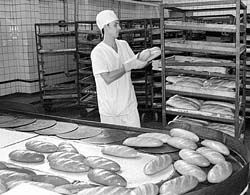Farewell to “social bread”
Regions no longer authorized to regulate bread prices
Shortly before its dismissal, the Ukrainian cabinet decided to deny the regional authorities an opportunity to build up their image in the eyes of the electorate. Now they can no longer play a favorite trump card before the elections by lowering bread prices. A cabinet resolution of August 31 canceled Cabinet Resolution #1150 (July 24, 2003) “On Shortcomings in the Work of Certain Executive Authorities in Securing Food Supplies and Measures to Stabilize the Basic Foods Market.” This document allowed local authorities to regulate bread and bakery prices. As of August 31, this has become the sole prerogative of the cabinet. Only the government has the right to intervene in basic food price-setting policy, which is vitally important to many Ukrainians. But one can only wonder if the government will actually deal with this issue, now that its own capacity rather than the population’s well-being is at stake.
Needless to say, bread suppliers have welcomed the news. Considering the increase in the cost of many services, fuel, and transport over the past several months, the price of bread cannot remain the same. Price reins were maintained only by the firm hand of local authorities, at times at the expense of losses for local bakeries. Volodymyr Pavlovsky, president of the All-Ukrainian Bakers’ Association (AUBA), commented on the cabinet resolution: “Until recently local authorities could place bakers on the verge of bankruptcy with a stroke of the pen. With the cancellation of Resolution #1150 we have guarantees that the future of this strategically important industry will not be in the hands of bureaucrats abiding by local rather than national interests.”
According to AUBA First Vice President Yevhen Leng, in the past, bakeries largely depended on the biased price-setting approaches of local state administrations. Local authorities could determine bread prices without allowing for the industry’s status and then revise them without coordinating with bakers.
It is likely that the AUBA leadership believes that bakeries’ effective business performance should be regarded as a national priority, rather than the possibility that poor citizens can buy bread. After all, this practically tallies with the principles of developing a business, says the president of Ukraine. Oleksandra Kuzhel, president of the Akademiya Analytical Center, told The Day that there should be no state regulation of prices on the bread market: “Neither the cabinet nor the regional authorities have the right to dictate prices on the bread market. They can create a market and take part in price-setting only when they give subsidies or soft loans to producers. The state can dictate prices only if it provided subsidies to the producer, or cheap or free credit lines. If there is a monopoly conspiracy on the market, the Antimonopoly Committee, which isn’t doing anything at the moment, should step in. In other cases, people must have the chance to somehow earn enough for their work and cover their expenses.”
This is correct, but will prices not soar as a result of the race for profitability on the part of various businesses? The AUBA people are still confident that this will not happen, assuring everyone that bakeries are not planning any bread price increases after the cancellation of state regulation on this market. However, experts believe that this will permit a substantial increase in wages in the industry. For example, Ukrzernoprom bakeries have increased wages by 30% as of September 1. AUBA statistics show that a number of other bakeries are intending to follow suit.
One can only feel glad for people who will be working at such profitable enterprises and receiving better wages. As for the notion “social bread,” meaning cheap bread for those who really need it, it will most likely be forgotten. Local authorities will not be able to afford this kind of commodity, not even during the race for popularity during pre-election campaigns. Oleksandra Kuzhel, nevertheless, proposes a solution to the problem: let the state provide free sanitary and epidemiological services, the cost of which has risen eight times in one year, to UAH 32,000-36,000. Then bakers will not add this expense to the value of bread and it will be considerably cheaper. The issue is for the people on the political Olympus to remember the needs of the average Ukrainian.






